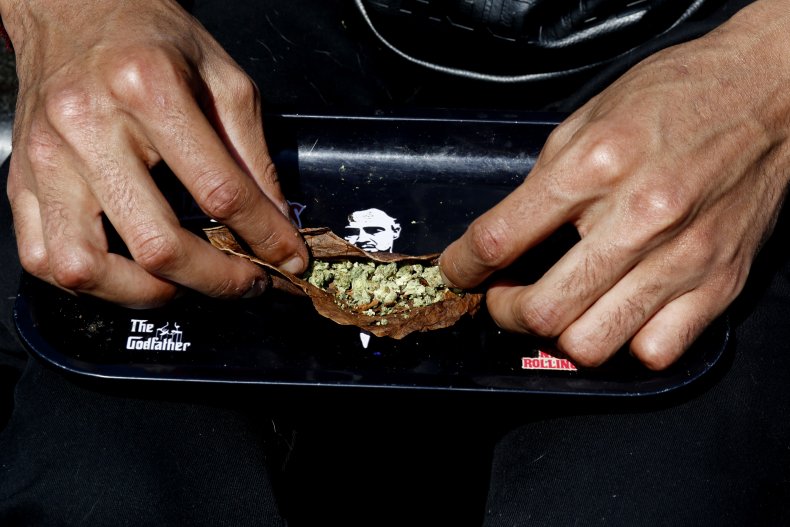My Autistic Son’s Pot Use Changed My Liberal View on Legalization
Our son, 25, has autism type 1, AD/HD, and cannabis use disorder (a fancy name for what we used to call being a pothead). He—and we—feel we have been failed by the mental health systems that are supposed to help him. Last fall, he became unhoused when, for his own protection (we were told), he was turned away from the psychiatric emergency room where other psychotic patients could have hurt him as a slim, “effeminate” gay man with communication difficulties caused by his autism.
He was given a “diagnostic impression” (not a diagnosis) of bipolar disorder after months of treatment with a variety of medications. The ones most used to treat bipolar had no effect on his mood or behavior. Half a year later it seems it was the cannabis that he took in unknown quantities that caused the manic episodes. Now that cannabis is legal in the New York metro area, our son’s problem has worsened.
We’ve tried to provide guidance and limitations on edibles and vaping, but it’s tough to do when the law doesn’t care. He likes the feeling of being high. It helps him forget his problems. But since he needs professional medication management, the unlimited access to cannabis, combined with his lack of self-awareness and judgment, has created a chaotic pinball game as he bounces around facilities as we researched solutions, waiting weeks for answers. Even long after COVID’s disability aide shortage was over, we were maddeningly told, “Sorry for the delayed response; we’re short-staffed.”
A man prepares a marijuana cigarette at Washington Square Park on April 20, in New York City.
Leonardo Munoz/VIEWpress
Two loving parents united in this gray area between disability rights and mental health care for our son are not enough. There are only two of us, and he isn’t our only child. We are woefully short on time and patience. It becomes impossible when disability supports and mental health care resources turn a blind eye and a deaf ear to each other.
And then legal cannabis thrusts its way in.
Neurodiversity, depression, and mind-altering substances are not a great mix. A neurologist undertook a brain study of our son that showed cognitive decline—at 25! Afterward, the psychiatrist asked our son, “So, do you value your brain? Do you want it to function properly?”
“Yeah…but I like getting high,” my son replied.
Despite all medical advice, a year in and out of several types of treatment, and proof of the ill effects of cannabis, he admits he would choose getting high.
Our son’s Medicaid coverage offers talk therapy, but the wait for a therapist is four to six months long. A housing voucher through New Jersey’s Division of Developmental Disabilities, along with federal Supplemental Security Income, is not enough for him to live on. Still, he remains unemployed because he thinks it is now his right to choose where and when to get high. This attitude and his intention to allow his cannabis use disorder to rule his life will surely lead him to long-term psychiatric and health problems, keeping him unemployable.
For now, we, his parents, are still his guardians and he gets treatment with a talk therapist through our private health insurance. The co-pays mount up week after week, and our son yesses the therapist to death while still harboring a desire (that he freely admits to me) to return to treating his own hopelessness and insomnia with vaping and gummies. Our son knows that a return to vaping violates the rules of his lease, and consuming any cannabis defies all advice he’s been given by medical and behavioral health providers. It doesn’t matter.
Despite seeing my son suffer so much and be so misunderstood, I am still a left-leaning Democratic voter. But I am no longer in favor of cannabis being legal. I think of the other parents whose adult kids have been incarcerated on marijuana charges. The social justice for them is meager, but in an ironic touch, New York State gives former offenders preference in opening cannabis dispensaries as a form of reparations, and like New Jersey, reaps sales tax for its coffers. As a former public-school teacher, I would love to see the extra funding go to public schools to create more robust academic support for all schoolchildren. It’s this idea of equality that has driven much of my thinking and voting for decades.
Meantime, adults with autism, who really are overwhelmingly naive, depressed, and under/unemployed, get hooked on the habit-forming high, spend money they don’t have on more cannabis products, and cause their families and themselves distress.
It is upsetting that the idea of democratizing and de-stigmatizing recreational weed, which I used to support, has colossally backfired for families like mine, whose plates were already full.
Nicoletta LaMarca Sacco (she/her) is a disAbility activist, daughter, wife, and mom. A writer, doctoral student, and Rotarian, she focuses on issues of social justice. She lives in the Catskills with her husband and two dogs.
The views expressed in this article are the writer’s own.
No Byline Policy
Editorial Guidelines
Corrections Policy
Source
